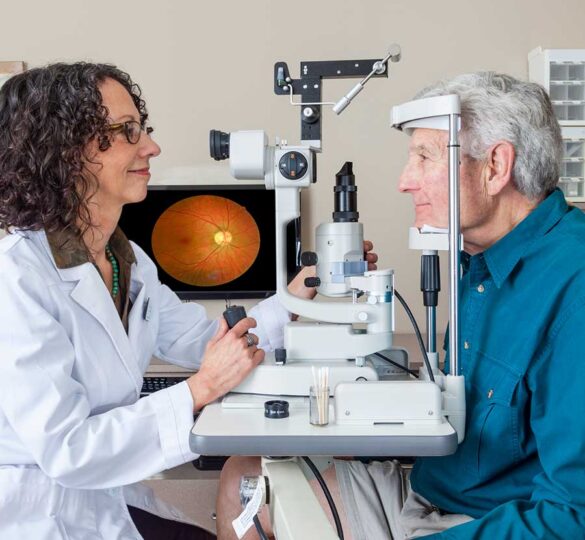The Differences Between Glaucoma and Macular Degeneration

Glaucoma and macular degeneration are two prevalent eye conditions that can lead to severe visual impairment if not addressed promptly.
However, understanding the differences between glaucoma and macular degeneration can be nuanced. Continue reading to learn more about the differences between these two causes of vision loss.
Glaucoma Overview
Glaucoma is a group of eye conditions characterized by damage to the optic nerve, typically (but not always) due to abnormally high pressure within the eye. The optic nerve is responsible for carrying images from the eye to the brain. Glaucoma is one of the leading causes of blindness for people over 60, although it can occur at any age.
Symptoms and Causes of Glaucoma
It’s important to note that glaucoma symptoms might not manifest in the early stages of the condition, and vision loss due to glaucoma cannot be regained. However, in some cases, people may experience:
- Patchy blind spots in peripheral or central vision, frequently in both eyes
- Tunnel vision in the advanced stages
Diagnosis and Treatment of Glaucoma
Glaucoma can be diagnosed through a comprehensive dilated eye exam that includes inspecting the optic nerve and measuring intraocular pressure. Although glaucoma damage is irreversible, medicine and surgery can help stop further damage. Treatment often includes prescription eye drops, oral medications, laser treatment, or surgery.
Macular Degeneration Overview
Macular degeneration, also known as age-related macular degeneration (AMD), is a common eye disorder in people over 50. AMD occurs when the retina’s central portion, the macula, responsible for sharp, central vision needed for activities like reading, driving, and recognizing faces, deteriorates. While the exact cause of the deterioration is unknown, it’s often associated with aging and genetic factors.
Symptoms and Causes of Macular Degeneration
The symptoms of AMD can vary but often include:
- Visual distortions, such as straight lines appearing as bent
- Reduced central vision in one or both eyes
- Difficulty recognizing faces
- A need for brighter light when reading or doing close work
Unlike glaucoma, AMD usually doesn’t lead to complete blindness, but it can significantly impair an individual’s ability to perform everyday tasks like reading and driving.
Diagnosis and Treatment of Macular Degeneration
Diagnosis of AMD involves a comprehensive eye exam, including tests to check for the presence of drusen (tiny yellow or white deposits under the retina) and changes in pigmentation in the retina.
Although there’s no cure for AMD, certain treatments can delay its progression or improve vision. Treatments include vitamins, laser therapy, medications to stop the growth of new blood vessels in the retina, and vision aids.
Critical Differences Between Glaucoma and Macular Degeneration
While both conditions can lead to vision loss, there are a few differences.
Area Affected
The primary difference between glaucoma and AMD lies in the parts of the eye they affect. Glaucoma affects the optic nerve, typically leading to peripheral vision loss. In contrast, AMD affects the macula, causing loss of central vision.
Symptoms
Another significant difference between glaucoma and AMD is their symptoms. Glaucoma is often called the “silent thief of sight” since it usually has no early symptoms, while AMD might cause distortions or blurriness in the central field of vision.
Risk Factors
While both conditions are more common in older adults, they have distinct risk factors. Glaucoma risk increases with age, particularly for people over 60. It also has a higher prevalence in people of African, Hispanic, or Asian heritage. A family history of glaucoma, high internal eye pressure, and certain medical conditions, like diabetes, also increase the risk.
Macular degeneration is also more common as people age, and other risk factors include genetics, smoking, obesity, high blood pressure, and a diet high in fats and low in fruits, vegetables, and fish.
Both conditions are age-related, but glaucoma has additional risk factors like high eye pressure, and AMD is more often associated with genetics and lifestyle factors like smoking.
Glaucoma and macular degeneration underscore the importance of regular eye exams, particularly for older people.
Help Us Provide Hope
With early diagnosis, treatment, and careful monitoring, glaucoma and AMD can be successfully treated, preventing them from causing permanent and significant vision impairment. Your support can help dedicated researchers continue to discover the causes and cures for glaucoma. In addition, your donations give hope to those living with glaucoma and accelerate our search for a cure.
Posted on May 26, 2023. Article reviewed for medical accuracy by Ahmad A. Aref, MD.

Ahmad A. Aref, MD, MBA
Dr. Aref is an Associate Professor of Ophthalmology and attending physician in the Glaucoma and Cataract Consultation Service at the University of Illinois. He serves as the Illinois Eye & Ear Infirmary’s Medical Director, Glaucoma Fellowship Director, and Vice Chair for Clinical Affairs.